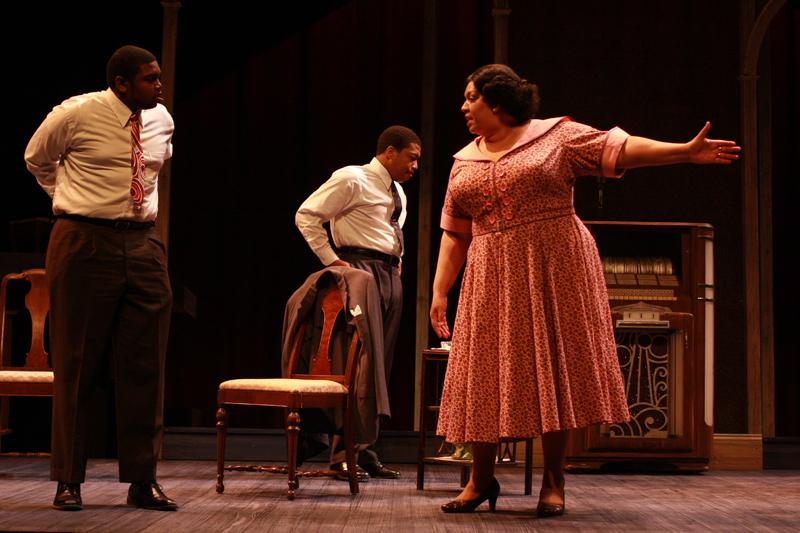Follow Me to Nellie’s Takes Dramatic Look at Civil Rights Movement
(From left) College senior Brandon Brown as Nellie’s husband, College senior Gynarva Monroe as Ossie Brown, and Cleveland-based actress Debra Rose as Nellie share a dramatic moment in Follow Me to Nellie’s. The play, which blended romance and small-town political intrigue, was performed at Hall Auditorium last weekend.
February 14, 2014
As one would predict of a play set in the South during the mid 1950s, racial conflict is at the forefront in Dominique Morisseau’s Follow Me to Nellie’s. Performed at Hall Auditorium on Feb. 6, 7 and 8, the play follows Northerner Ossie Brown, played by College senior Gynarva Monroe, who moves to Natchez, MS on a quest to register blacks to vote, becoming a wanted figure in the town. Nellie, a middle-aged woman played by Cleveland-based actress Debra Rose, begrudgingly agrees to let Brown take refuge in her brothel. Brown’s love for Nellie’s adopted daughter Na Rose, played by College first-year Zoë Davidson, becomes another central conflict in the plot. Will Brown be caught by the town for his abolitionist efforts? And will Tom Robertson, Jr., the sheriff’s son enlisted to find and kill Brown, played by College senior Hayes Biche, succumb to the local pressure that brings his own romantic feelings for Na Rose into question?
Act I progressed with subtle ambition, continuously introducing new conflict with a slight, humorous hand. In one particularly well-crafted scene, the sheriff informs Brown of the fate of a previous rabble-rouser, the peril of Brown’s situation increasingly evident as the sheriff graphically describes the recent tar and feathering. Tom’s threat is still lingering on stage, encapsulated in Brown’s body language — he sits on the porch steps, head in hands — when Rose saunters in. Quickly, the haunting tension becomes playful as it is redirected between the soon-to-be lovers. When the scene finally culminates in a cathartic embrace between Rose and Brown — received with “oohs” from the audience — the sheriff’s thinly veiled threats drift even further into the background, ominously anticipating resolution.
Most, if not all, of the scenes in the act followed a similar pattern: mounting racial tension disguised in the playfulness and humor of romance and lust. By intermission, the plot had reached a tangle of conflicts, each promising an exciting avenue of resolution.
Unfortunately, this left Act II with quite a challenge. Morisseau’s final scene is reminiscent of classical plays wherein playwrights enlisted mass carnage for a tidy ending. The jarring “Death to all!” finale seemed like an easy out, especially after the revving of Act I’s anticipatory engine.
Beyond the frantic ending, Act II in general turned down the charm to make space for the dramatic plot to run its course. However, the growing seriousness of the unfolding events unfortunately quenched the humor in the dialogue.
To the play’s advantage, the acting was solid. From Rose’s bashful underwear dance scene, to Brown’s confusion and frustration with racial issues, to the drunken anti-hero charm of prostitute Marla, stunningly performed by College junior Christal Bell, the talent onstage cemented together what could have been a disastrously fragmented first and second act. Moreover, in scenes in which plot tensions reached an overly dramatic volume, the performers were able to defuse heated situations with convincing ease.
There were two smaller caveats to the overall solid performance of the actors, though they ultimately did not detract from the production’s quality: Nellie’s cough and Rose’s singing. Nellie’s cough was not only unconvincing — and borderline funny — it didn’t develop into anything more than a minor plot point for Rose, who is torn between joining a local singing group and caring for her ailing guardian. Rose’s voice itself, which is supposed to be so siren-like it enchants both Robertson and Brown, was decent, but not exactly the alluring force implied by the storyline. Nonetheless, Rose herself was so charming that it was hard not to fall in love with her.
Acting and storyline aside, Brown’s realizations throughout the play struck a resonant chord with its presentation on an Oberlin stage. In one scene, Brown sits with Rose in the brothel’s parlor, injured and desperate to flee the angry mob looking for him. He confesses to her his skewed expectations of the South — he’d imagined that being a well-educated, well-intentioned man was enough to help others; he hadn’t expected that the men in Natchez simply wouldn’t care about his degree. His epiphany had situational profundity on an Oberlin stage — when he explained to Rose that when you’re in the liberal bubble of academia, surrounded by other activists, “You forget Mississippi.”

























